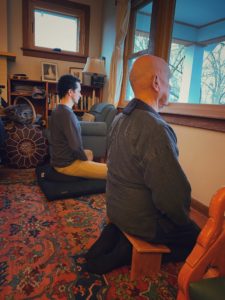Last winter a friend and I experienced the longest 11 days of our lives. She was visiting from South Africa, and we met for tea at Boots Bakery. I was waiting for the right moment to ask her advice on developing unwavering self-confidence. During a lull in the conversation she inadvertently pre-empted, “You want to go to a Vipassana retreat with me?” It was one of those moments where the answer to a pressing question has arrived, and it’s not the one you wanted.
I called my dad who practices Vipassana at a stupa-filled monastery in Bali.
“What do you think, Dad? Should I go?”
“Definitely,” he said.
“Why?”
“For the same reason people pray, or take drugs, or climb mountains.”
A month later my friend and I arrived in the snowy mountains outside Merritt, British Columbia, at Dhamma Surabhi Meditation Center. We put off checking in as long as we could, driving around on logging roads until dusk, savoring the last moments of normal life. And then it was time. We relinquished all communication devices, were shown our cot in a small bare room, and began our 10 days of silent meditation—a self-imposed prison for people seeking change in their lives.
We got five of hours sleep nightly, rising for the first “sitting” from 4 to 6 a.m. Then breakfast, more sitting, and a vegan lunch at 11:30, which is the last meal until the next morning. For the afternoon and evening, we were back to the cushion, muscles on fire, trying to hold ourselves up. During the breaks, no music, reading, writing or vigorous exercise was allowed—just a roped in area outside for walking, thankfully among trees.
To keep the focus inward, you were not supposed to look in others’ eyes or even gesture. However, there was a sharing of sorts, the communication of orbiting around each other. Personalities were expressed differently in this context than in verbal exchanges. Moving silently and slowly with mostly young athletic men was reminiscent of stoic cowboys in a saloon, vigilant and poised, a potential shoot out in the air. Though here, they were harmless.

The experience was quite challenging mentally and physically—not to mention unexpected symptoms that arise. At various points, I was sure I had diabetes, cancer, a heart attack, and a couple strokes. Why subject yourself to this pressure cooker of hardship and austerity with only the sounds of chewing, sneezing, coughing, footsteps, and the restroom?
My friend and I returned home with an enduring agency over impulsive desires and dislikes. We learned meditation can reduce the need for sleep, periods of not talking are enjoyable, and you can go without dinner. We let go of worrying about other people’s impressions and judgments and ours of them. We learned to feel at ease with the pain of discomfort and with self-discipline.
For most of us, modern life doesn’t afford the same hardships it used to. Instead of toil and pain, we face anxiety, depression, and addiction—the ills of a distracted, disconnected, overly stimulated population. Sometimes the antidote to these maladies is choosing the right hardship, such as Vipassana. Should you venture out for an enlightenment prison experience, seek advice from veterans on how to survive: the pillows to bring, ear plugs, anti-inflammatories, massage tools, etc. Happy inner travels!
More Enlightenment-Seeking Practices
Shedding worldly comforts to achieve insight is a perennial practice, and there are many options if Vipassana doesn’t appeal.
- My dentist attends a non-denominational Christian church that encourages 23 days of fasting, meditation, or prayer. Her current “fast” is from social media.
- The Wim Hof method, popular among outdoor athletes, which uses breath and cold water to transform the body and mind.
- Gentler Holotropic Breathing uses similar techniques of controlled hyperventilation.
- Gentler yet, try flotation tanks.
- Want extreme? Fly to Germany for a dark retreat where you spend days to weeks alone in a room with no light. Podcaster and “human optimizer” Aubrey Marcus in a recent episode says it’s unparalleled in intensity.













